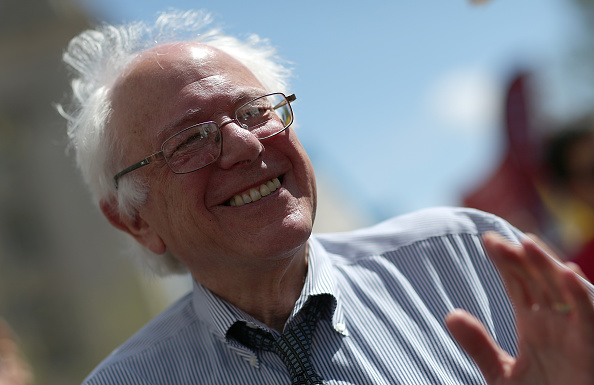No, Bernie Sanders isn't proposing to spend $18 trillion


A free daily email with the biggest news stories of the day – and the best features from TheWeek.com
You are now subscribed
Your newsletter sign-up was successful
On Tuesday, The Wall Street Journal had a pretty jaw-dropping analysis tallying the costs of Sen. Bernie Sanders' (I-Vt.) proposals should he win the Democratic nomination then the White House. But is he really proposing $18 trillion in new spending over 10 years? It may surprise you that The Wall Street Journal isn't exactly playing it straight with a self-avowed democratic socialist candidate, but the price tag is, at the very least, misleading.
"While Sanders does want to spend significant amounts of money, almost all of it is on things we're already paying for," explains Paul Waldman at The Washington Post. "He just wants to change how we pay for them." A lot of that involves new taxes to replace costs borne by some smaller population — free college tuition, for example — which may or may not suit your policy preferences, Waldman notes, but "we shouldn't treat his proposals as though they're going to cost us $18 trillion on top of what we're already paying."
As a prime example, he looks at the biggest expense in The Journal's ledger: $15 trillion for a single-payer national health care system — a number that doesn't come from Sanders but a separate bill in Congress. To begin with, according to the federal government, the U.S. is already projected to spend $42 trillion on health care over the next 10 years. Waldman continues: "Would that be $15 trillion in new money we'd be spending? No, it would be money that we're already spending on health care, but now it would go through government."
The Week
Escape your echo chamber. Get the facts behind the news, plus analysis from multiple perspectives.

Sign up for The Week's Free Newsletters
From our morning news briefing to a weekly Good News Newsletter, get the best of The Week delivered directly to your inbox.
From our morning news briefing to a weekly Good News Newsletter, get the best of The Week delivered directly to your inbox.
You can read the rest of Waldman's analysis at The Washington Post, but he ends with a good general note of caution: "As a general matter, when you see a headline with an unimaginably large number, chances are it's going to confuse you more than it will enlighten you."
A free daily email with the biggest news stories of the day – and the best features from TheWeek.com
Peter has worked as a news and culture writer and editor at The Week since the site's launch in 2008. He covers politics, world affairs, religion and cultural currents. His journalism career began as a copy editor at a financial newswire and has included editorial positions at The New York Times Magazine, Facts on File, and Oregon State University.
-
 How the FCC’s ‘equal time’ rule works
How the FCC’s ‘equal time’ rule worksIn the Spotlight The law is at the heart of the Colbert-CBS conflict
-
 What is the endgame in the DHS shutdown?
What is the endgame in the DHS shutdown?Today’s Big Question Democrats want to rein in ICE’s immigration crackdown
-
 ‘Poor time management isn’t just an inconvenience’
‘Poor time management isn’t just an inconvenience’Instant Opinion Opinion, comment and editorials of the day
-
 Witkoff and Kushner tackle Ukraine, Iran in Geneva
Witkoff and Kushner tackle Ukraine, Iran in GenevaSpeed Read Steve Witkoff and Jared Kushner held negotiations aimed at securing a nuclear deal with Iran and an end to Russia’s war in Ukraine
-
 Pentagon spokesperson forced out as DHS’s resigns
Pentagon spokesperson forced out as DHS’s resignsSpeed Read Senior military adviser Col. David Butler was fired by Pete Hegseth and Homeland Security spokesperson Tricia McLaughlin is resigning
-
 Judge orders Washington slavery exhibit restored
Judge orders Washington slavery exhibit restoredSpeed Read The Trump administration took down displays about slavery at the President’s House Site in Philadelphia
-
 Hyatt chair joins growing list of Epstein files losers
Hyatt chair joins growing list of Epstein files losersSpeed Read Thomas Pritzker stepped down as executive chair of the Hyatt Hotels Corporation over his ties with Jeffrey Epstein and Ghislaine Maxwell
-
 Judge blocks Hegseth from punishing Kelly over video
Judge blocks Hegseth from punishing Kelly over videoSpeed Read Defense Secretary Pete Hegseth pushed for the senator to be demoted over a video in which he reminds military officials they should refuse illegal orders
-
 Trump’s EPA kills legal basis for federal climate policy
Trump’s EPA kills legal basis for federal climate policySpeed Read The government’s authority to regulate several planet-warming pollutants has been repealed
-
 House votes to end Trump’s Canada tariffs
House votes to end Trump’s Canada tariffsSpeed Read Six Republicans joined with Democrats to repeal the president’s tariffs
-
 Bondi, Democrats clash over Epstein in hearing
Bondi, Democrats clash over Epstein in hearingSpeed Read Attorney General Pam Bondi ignored survivors of convicted sex offender Jeffrey Epstein and demanded that Democrats apologize to Trump
